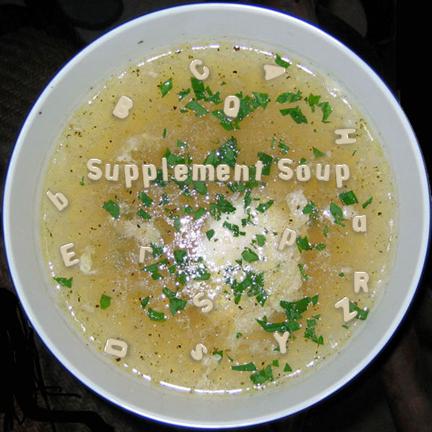 Did
you know that $20 billion is spent yearly on dietary supplements such as
Folate, Antioxidants (Vitamins A, E, and Selenium), Calcium, Vitamin D, Red
Yeast Rice, Fish oil, and Niacin? It's a big business.
Did
you know that $20 billion is spent yearly on dietary supplements such as
Folate, Antioxidants (Vitamins A, E, and Selenium), Calcium, Vitamin D, Red
Yeast Rice, Fish oil, and Niacin? It's a big business.
Vitamin
supplementation is not necessary for
most adults who eat a well-balanced diet and get regular sun exposure.
Food should be the source of vital
nutrients
I
must say this 20 times a day. If you want a sure fire way to get your vitamins
and minerals from food, I encourage you to read my Straight Talk blog. We have been preaching the benefits of food choices like
olive oil, nuts, beans, fish, and fruits and vegetables for years. This is the
basis for The Mediterranean Diet. It should be taught
in preschool!
 Be cautious about supplements
Be cautious about supplements
Supplements
can help make up for deficiencies in your diet or supply an extra boost for
certain populations. In excess, they can be not only costly but also harmful. They
can even interact with medicines you are taking and have side effects just like
drugs.
In
my practice, patients frequently ask about the 9 nutrients/supplements shown
below that get lots of press. Consider
the facts then talk with your physician about what's in your diet and whether or not a
supplement might be right for you.
Nutrient/
Supplement
| Food
Sources
-
the Best
Choice
| Benefits
| Cautions
|
Folate
Folic
Acid,
a B vitamin
| Green
leafy vegetables, fruits, cereals, grains, nuts.
| Metabolic
processes
like growth, reproduction, producing
red
blood cells.
Helpful for
women of child-bearing age
or pregnant
to prevent
neural tube birth defects.
| No
evidence of cardiovascular benefit
with Folate supplementation.
|
| Vitamin
A Beta-carotene
| Vitamin A: liver,
kidney, egg yolk, dairy. Beta-carotene:
orange vegetables, carrots,
dark-green
leafy vegetables. | Healthy
skin, strong teeth and bones in children, resistance
to
infection, normal growth, cell structure, normal eyesight. | Excess
leads to increased risk of early deaths and cancer;
causes fetal loss
and birth defects
during 1st trimester of pregnancy.
|
| Vitamin E | Green leafy
vegetables,
nuts,
cereals,
meats, egg yolks,
wheat germ, whole grains. | Antioxidant
helps protect cells from free-radical damage,
and boosts immune system. Good
for
elderly women
at risk for fracture.
| Trials
showed no evidence of cardiovascular benefit of supplementation and showed an increased risk of heart
failure and stroke. |
| Selenium Trace
element | Broccoli, cabbage, celery, onions,
garlic, whole grains, brewer's yeast. | Functions
not
entirely understood, but necessary for optimal health. | Can be harmful
and increase risk of prostate
cancer.
|
Calcium
Mineral | Dairy,
green leafy vegetables, broccoli. Fortified
products.
| Healthy bones and teeth, nerve
conduction, muscle contraction, blood clotting, production of energy, immunity
to disease. | It is complicated and excess can be harmful. Read Calcium for
Bones at Your Heart's Expense?
|
| Vitamin
D
| Sunlight;
fortified milk and other foods.
| Helps body absorb calcium for
strong bones. Important to body in many other ways and found in virtually every
cell.
| Excess can be toxic, raise blood levels of calcium, lead to heart rhythm disorders and other
problems. |
Red
Yeast Rice
Botanical
| Made
by culturing rice with strains
of the yeast Monascus
purpureus; used in Chinese cuisine or
medicinal
products.
| Minimally lowers total
cholesterol and LDL, although it does not increase HDL.
| Varies greatly across commercial preparations. May have same side effects
as lovastatin.
|
Omega-3
Fatty
Acid
Fish Oil
| Fatty fish like Salmon
or Herring;
Tofu and
other forms of soybeans.
Walnuts, flaxseeds,
canola oil contain alpha-linolenic acid (LNA), which converts to omega-3s in the body.
| Slow the growth rate of atherosclerotic plaques,
help lower
blood pressure, lower Triglycerides, and decrease risk of
arrhythmias (abnormal heartbeats) which can lead to Sudden Cardiac
Death. | Supplements
are not a substitute for eating fish in a balanced diet. Read Omega-3,
Fish and Fish Oil Supplements.
|
Niacin
Vitamin B3
| Lean meats, fish, whole grains.
| Helps
the digestion,
skin,
and nerves to function; important for converting food to energy. Lowers LDL, Triglycerides; raises HDL.
| No benefit when you already take a statin. Excess can
raise blood sugar. Read Women &
Cholesterol: Top 5 Myths Debunked.
|
On this website, see Nutrition: Vitamins
and Minerals.
And for the kids, see Project Heart Activity Masters for Grade 5: "My Vitamin Dictionary" and "My Mineral Dictionary".
|
For a quick reference to recommended daily values of key nutrients, see US Food and Drug Administration:
Calculate the Percent Daily Value for Appropriate Nutrients.
Want to learn more? Visit the National Institutes of Health - Office of Dietary Supplements.
Until next time!

Stephanie Coulter, MD
Special thanks to Dr. Karla
Campos for her assistance in writing Straight Talk.
Do you have a topic that you would like to learn more about from Dr. Stephanie? Send us an email at women@texasheart.org and your question may be the next Straight Talk topic!
We are saving hearts and trees. The
Women's Heart Health E-News is sent via e-mail and posted online. Sign up using the form on this page.
Visit the Center for Women's Heart & Vascular Health at www.texasheart.org/women.

